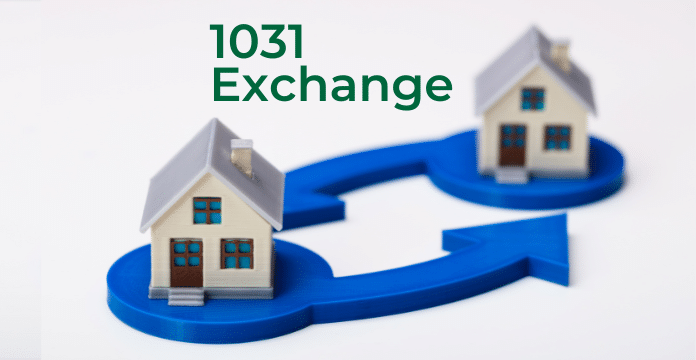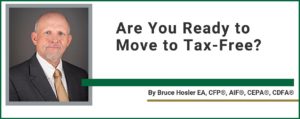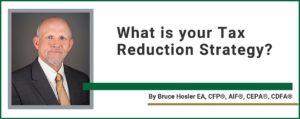How Property Owners Can Limit Taxes with a 1031 Exchange
Our team at Hosler Wealth Management focuses on limiting the amount of taxes our clients pay as they approach and enter retirement.
One tax-saving tool is the 1031 exchange. Let’s look closer at what it is and how it can help you limit your tax liability.
What is a 1031 Exchange?
Simply put, a 1031 exchange is a tax break for real estate investors.
The name refers to the section of the Internal Revenue Code that allows real estate property owners to defer capital gains taxes by reinvesting proceeds from a business or investment property sale into another property. In other words, the seller exchanges one property for another without having to pay taxes on any capital gains.
There’s no limit on how often you can perform a 1031 exchange. Investors can roll over the gains from one property to another and another, avoiding taxes until they cash out and pay a one-time, long-term capital gains tax at whatever the current rate happens to be. Or, if you hold on to your last property until you die, you can potentially receive a step-up in basis for your heirs, never having to pay the capital gains tax.
Although the concept of a 1031 exchange is relatively straightforward, there are several rules you must abide by to qualify. And sometimes, it can be difficult to fulfill these requirements.
- Qualified Intermediary: To qualify for a 1031 exchange, you must work with a qualified intermediary. Essentially, they are a third party who holds your funds in escrow until you purchase a new property. If you want to do a 1031 exchange, you can’t touch the funds for any reason.
- 45-Day Rule: Within 45 days of selling your property, the IRS requires you to identify up to three properties as possible replacements. To qualify for a 1031, you must close on at least one of them.
- 180-Day Rule: To take advantage of a 1031 exchange, you must purchase one of your designated properties within 180 days of selling your old property.
It’s critical to remember that the 45- and 180-day rules run concurrently. The clock on both starts running when your initial property sale closes. For example, if you take a full 45 days to designate your replacement property, you’ll have 135 days left to close on it.
Potential Tax Implications with 1031 Exchanges
The purpose of pursuing a 1031 exchange is to defer capital gains tax on real estate property appreciation. However, you may owe taxes in certain situations.
- Leftover Cash: For example, if you sell a property for $1 million and purchase a replacement property for $900,000, your qualified intermediary will distribute that extra $100,000 to you following the 180-day window for closing on a new property. That cash, known as a boot, will be taxed as partial sales proceeds, generally as a capital gain.
- Lower Debt/Mortgage Liability: Debt or mortgages on your sold property can trigger a taxable event when you purchase your replacement property. Say you had a $1 million mortgage on your old property but your new mortgage on your new property is only $900,000. In this case, you have a $100,000 gain that also will be classified as a boot and taxed.
- Depreciable Property: If you swap depreciable property as part of your 1031 exchange, you can also trigger another taxable event known as depreciation recapture. Taxed as ordinary income depreciation – recapture would occur if you exchange improved property, such as land with a building. In this instance, the depreciation you’ve previously claimed on the building will be recaptured and taxed as ordinary income.
Have Questions About Tax Strategies?
The experienced team at Hosler Wealth Management can help you determine the most appropriate tax strategies for your unique situation.
Request a call or send us a message to see how our tax specialists in Scottsdale and Prescott can help you explore your options.
This material is intended for informational/educational purposes only and should not be construed as specific tax, legal or investment advice. Individual circumstances may vary.
Disclosure: Securities and advisory services offered through Commonwealth Financial Network®, Member www.FINRA.org/www.SIPC.org, a Registered Investment Adviser. 700 S. Montezuma Street, Prescott, AZ 86303. Phone: 928.778.7666. This communication is strictly intended for individuals residing in AK, AZ, CA, CO, FL, GA, HI, ID, IL, MA, ME, NE, NJ, NM, NV, OH, TX, UT, VA, WA, WI. No offers may be made or accepted from any resident outside these states due to various state requirements and registration requirements regarding products and services. Fixed Insurance products and services offered through CES Insurance Agency. Tax preparation and accounting service offered by Hosler Wealth Management, LLC are separate and unrelated to Commonwealth. Any tax advice contained in this article is not intended or written to be used, and cannot be used, for the purpose of (i) avoiding Federal or State tax penalties or (ii) promoting, marketing, or recommending to another party any transaction or matter addressed herein.
© 2023 Hosler Wealth Management LLC






Leave A Comment